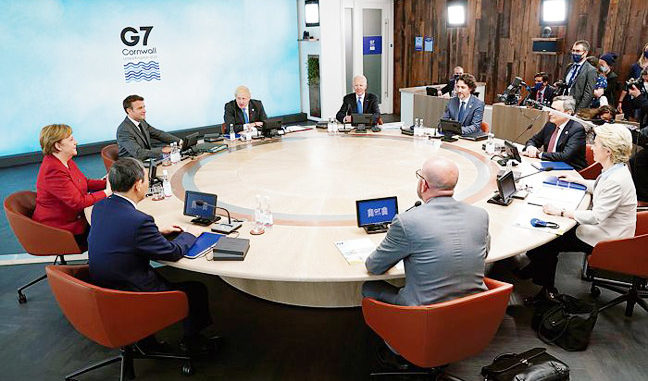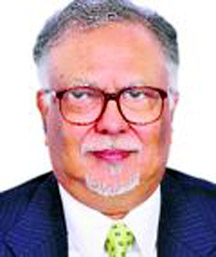

“The US and Europe have fundamental contradictions with regard to China and Russia. While the US faces an immediate threat from China, many European countries have extensive economic ties with China and no security concerns. For Europe, the more immediate threat is from Russia, a perception not fully shared by the US. Several European countries weren’t happy that the US (and NATO) resources would be drawn away from Moscow to a more distant China.”
President Biden’s initiatives would strengthen transatlantic unity and build on resetting relations with Russia, isolating China. It may even embolden some of Xi’s critics at home to question whether his wolf warrior diplomacy had yielded any positive results for the country.
President Biden’s first foreign visit to Europe from June 9-16 will be remembered for how he tamed dissenting and doubting allies and rejuvenated the transatlantic alliance to convey a message of strong unity and resolve to an aggressive China (and a combative Russia), which is trying to challenge the international order for unilateral gains. China was the dominant theme during his discussions with G-7 leaders at Cornwall, UK (June 11-13) and EU and NATO leaders (June 14-16) at Brussels and Geneva and the underlying theme in his discussions with President Putin on July 16. The final G-7 communiqué is dominated by the US with several paras aimed directly and indirectly against China (and some against Russia), such as eradicating the use of forced labor in global supply chains (reference to Xinjiang and Tibet), collective approaches to challenge unfair trade policies, use of technologies to promote democratic values and fundamental freedoms. The G-7 supported President Biden’s initiative of “a timely, transparent, expert-led and science-based WHO-convened phase-2 Covid-19 origins study in China”. It is going to rile China as its senior diplomat Yang Jiechi had urged the US Secretary of State Anthony Blinken in his phone conversation on June 11 to “not politicize the source of the virus and focus on global cooperation in the fight against the disease”. The group’s formulation on China’s human rights abuse in Xinjiang, respect for fundamental freedoms and a high degree of autonomy for Hong Kong is a compromise as the mention of genocide which the US wanted was dropped to accommodate the concerns of Germany, France and Italy. The US and Europe have fundamental contradictions with regard to China and Russia. While the US faces an immediate threat from China, many European countries have extensive economic ties with Beijing and no security concerns. For Europe, the more immediate threat is from Russia, a perception not fully shared by the US. Several European countries were not happy that the resources of US (and NATO) would be drawn away from Moscow, their primary threat, to a more distant China. They were also worried that taking a hard line on China would make her less receptive to cooperate on more pressing multilateral issues such as climate change, control of pandemics and trade. For the first time, the G-7 took a united stand against China on an issue of core interest to her, i.e., Taiwan, and in support of the US by agreeing on the “importance of peace and stability across the Taiwan Strait and peaceful resolution of cross-strait disputes”. The G-7 unveiled a new initiative known as “Build Back Better World” (B3W) to give an alternative choice to the developing countries in building infrastructure to spare themselves from China’s debt trap projects. The group has agreed to provide one billion doses of coronavirus vaccines in 2021-22 and more later. At Cornwall G-7 meetings, India was more deeply engaged at the ministerial and PM’s level. PM Modi spoke of the need for democratic societies to strengthen each other’s hands to respond to new challenges, India’s efforts to share its development partnership with other developing countries, its readiness to work with B3W partners and its engagement with WHO, G-20 and G-7 countries for dealing with the current pandemic and preparing for future pandemics.
NATO leaders’ 79-point statement devoted three paragraphs with 10 mentions castigating China’s behavior. It said: “China’s stated ambitions and assertive behavior present systematic challenges to the rules-based international order”. China is investing heavily in new disruptive technologies such as autonomous systems, facial recognition and artificial intelligence and putting these into new weapon systems, which are changing the nature of warfare never seen before. China should act responsibly in the international system, including in space, cyber and maritime domains, in keeping with its role as a major power. President Biden’s meeting with President Putin at Geneva (June 16) was another high point of this visit. It reflected his desire to focus on the escalating rivalry between the US and China by reducing tensions with Moscow. He improved the atmospherics by calling Russia as one of the two Great Powers (other being the US and not China) and President Putin a worthy adversary, which would have been music to Putin’s ears. Though the results of the meeting were modest (establishment of bilateral strategic stability dialogue for control of new and dangerous weapons, limitation on the use of cyber weapons and return of Ambassadors) it is expected to promote a dialogue between the two countries on other issues of mutual concern, reducing current hostility and tensions.
China would be disappointed as it had always thought that the huge dependence of the US’s European and Asian allies on her would never allow emergence of a unified transatlantic bloc aimed against Beijing. Though some differences remain on the economic issues, President Biden has been able to rally his disparate allies together. The EU has frozen the Comprehensive Agreement on Investment hurriedly concluded by Beijing in December 2020 before President Biden’s takeover.
President Xi Jinping had tried to forge a united front with Russia by deputing his senior diplomat Yang Jiechi to Moscow but that ploy has not worked. Chinese official media has grudgingly admitted that the “Geneva meeting shows that both sides have the will to stop the worsening US-Russia relationship. President Biden wants to ease the tensions with Russia to focus on dealing with China now”.
President Biden’s initiatives would strengthen transatlantic unity and build on resetting relations with Russia, isolating China. It may even embolden some of Xi’s critics at home to question whether his wolf warrior diplomacy had yielded any positive results for the country. It would add increasing pressure on Xi to defend himself as he rallies the Chinese Communist Party to celebrate 100 years of its foundation in July 2021 and is likely to temper China’s aggressive behavior toward its neighbors.
(The author is a former Ambassador)





Be the first to comment